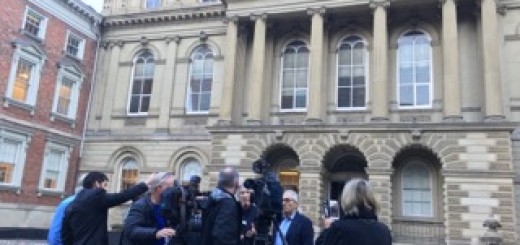SCC Grants Leave to Appeal for Beaver Lake Cree Nation’s Advanced Legal Cost Claim in Anderson v Alberta (Attorney General)

In the last three decades, Indigenous nations have increasingly chosen to address systemic injustices facing their communities through litigation. However, as many Aboriginal law cases are complex and novel in nature, Indigenous nations had to bear the associated legal fees as the cases moved through Canadian courts. Anderson v Alberta (Attorney General), 2020 ABCA 238 [Anderson CA], is one such case. The plaintiff, Beaver Lake Cree Nation (BLCN), filed its Statement of Claim against Canada and Alberta in 2008, accusing the federal and provincial governments of making a series of decisions that cumulatively led to violations of Treaty 6 promises, which if kept, would have ensured the continuation of Aboriginal hunting and fishing practices on treaty land. The decade-long court battle that followed has depleted BLCN’s financial resources and the nation is now seeking advance costs from the defendants.
Last month, the Supreme Court of Canada (SCC) granted Anderson leave to appeal. The forthcoming SCC decision will consider the issue of whether to uphold the trial court decision granting the advanced cost order. The SCC decision could fundamentally alter the way advance costs are calculated, promote access to justice, and further empower First Nations to exercise their Aboriginal and treaty rights through litigation.
Background
In 2008, BCLN raised a novel claim against the defendants. They claimed that Canada and Alberta had committed a systemic failure to manage the “taking up” of lands (Lameman v Alberta, 2011 ABQB 40 [Lameman 2011 I]). Consequently, BLCN sought declarations that the defendants have a duty to consult and accommodate the plaintiffs on the cumulative effects of developments that infringe on treaty rights, have a duty to revoke development projects which unjustifiably infringe Plaintiffs’ treaty rights, and develop an appropriate process to address all the infringements listed in their claim (Lameman 2011 I, para 6).
The financial burden of litigation has been at the core of BLCN’s court battle since its inception. In 2011, BCLN applied for an adjournment before hearings on Applications to Strike, stating that a lack of finances made it difficult to prepare for the pleadings in the designated time (Lameman 2011 I, para 14). The court refused the application for adjournment, on the grounds that the adjournment was “a deliberate delay tactic” and did not concern a change in law or a change in approach to litigation (Lameman 2011 I, para 71). The defendants successfully sought costs for the legal fees associated with the application to adjourn, to be paid immediately by BLCN, and the leave to appeal to this order of costs was later denied (Lameman v Alberta, 2011 ABQB 532; Lameman v Alberta, 2011 ABQB 724).
In the same year, BLCN requested from the court that lawyers from Tooks Chambers, UK (“Tooks barristers”), an entirely pro bono law firm, be granted a right of audience to assist in their case (Lameman v Alberta, 2011 ABQB 396 [Lameman 2011 II]). The court denied their application, citing rule 2.23 of the Alberta Rules of Court, Alta Reg 124/2010, which stated that assistance rendered cannot be provided by those not an active member of the Law Society of Alberta, in accordance to s. 106(1) of the Legal Profession Act, RSA 2000, c L-8 (Lameman 2011 II, para 43). Tooks barristers were only licensed in the UK, but BLCN had sought their assistance as they could not afford legal fees otherwise. The decision was appealed, but to no avail (Lameman v Alberta, 2012 ABCA 59).
The above trials, in addition to delays in closing of pleadings, striking of claims, and production of documents, have resulted in BLCN spending approximately $3 million on legal fees (Anderson CA, para 3).
New Approach: BLCN Seeks Advanced Costs
After various unsuccessful attempts to minimize legal expenditures, BLCN changed their approach and applied for an order of advanced costs in 2019, seeking a total sum of $5 million to proceed with their Statement of Claim (Anderson v Alberta (Attorney General), 2019 ABQB 746 [Anderson QB]).
The test for assessing whether interim costs should be awarded requires the court to review whether the party demonstrates impecuniosity, presents a meritorious case, and raises issues of public importance (British Columbia (Minister of Forests) v Okanagan Indian Band, 2003 SCC 71). The SCC has elaborated on the three factors of this test, stating that a public interest advance cost is “exceptional” and must only be granted if the injustice that arises following its dismissal would affect both the individual and the public at large (Little Sisters Book and Art Emporium v Canada (Commissioner of Customs and Revenue), 2007 SCC 2 [Little Sisters], para 38). Additionally, the applicant has the burden of demonstrating that all other funding options were explored prior to the application and it would be “impossible” to proceed with litigation without the order (Little Sisters, paras 39, 71).
The parties conceded that BLCN’s claim is prima facie meritorious and the trial judge had no difficulty finding that the case is of public importance. The point of contention was whether BCLN could demonstrate impecuniosity. The trial judge found that annually, BLCN was paying $300,000 in legal fees for the present litigation but the nation had a surplus in its net financial assets (Anderson QB, paras 27, 31). The trial judge then proceeded to review BLCN’s available sources of funding individually, including government funding, industry-generated revenue, and other sources, to find that the nation had approximately $3 million in assets to pay for their litigation (Anderson QB, para 51).
That said, the court acknowledged that BLCN had substantial debt, other ongoing litigation files, and “pressing infrastructural and social needs” to be met in the community which may lead to depletion of the net assets. As the court found that “funding this litigation must be weighed against the community’s other pressing needs,” the trial judge concluded by ordering Canada and Alberta to each provide $300,000 a year in advanced costs to bolster the $300,000 already covered by BLCN until the trial is concluded (Anderson QB, paras 60, 67).
Not Impecunious Enough? Advanced Costs Order Overturned
The governments of Canada and Alberta appealed the trial court advanced costs order on the basis that the “impecuniosity” branch of the test was not met (Anderson CA, para 16). Though the Crowns agreed that the applicant need not be destitute to have access to advance costs, they argued that the test is whether “there are funds available, not whether there would be funds left over once all other preferred expenditures of the applicant have been met” (Anderson CA, para 26). The court agreed with the Crowns that because BLCN had $3 million to use towards its legal fees, in addition to a Specific Claim settlement reward which amounted to $2.97 million, the test for advanced costs order was not met (Anderson CA, para 33).
The court added that even if the advance costs award had been found justified, the terms of the order was unreasonable. The order did not reach a reasonable balance with the resources which could be provided by BLCN and the governments nor did it provide for any refunding of costs in case of a “windfall”, and the quantum of the order was unjustified (Anderson CA, paras 37-9). Since advanced costs consist of public funds, the court concluded that a more definite structure of funding ought to be advanced by the applicant to ensure that the amount is regulated (Anderson CA, para 40).
What the SCC Decision Might Mean
In granting the leave to appeal, the SCC has taken on the task of answering a key issue: the definition of “impecuniosity” in the context of an advanced costs award. The SCC can either opt to take a broad approach in defining impecuniosity by having the applicant demonstrate that a large portion of their assets must go towards litigation, or take a narrow approach by applying the appellate court definition of impecuniosity, such that presence of any funds which can be used towards litigation would indicate otherwise. If the court chooses to define impecuniosity broadly, it may raise concerns about the advanced costs order becoming too widely accessible for applicants. However, implementing the narrow definition will mean that applicants must deplete any funds which may be kept aside for other purposes for the sole reason of proceeding with litigation. Indeed, if the appellate court’s definition was followed, approximately half of the BLCN’s assets will be used towards this one litigation case alone, and only after then could they seek out financial assistance from the government.
Moreover, though the concern of making the order too accessible is a valid one, it is important to consider there are additional branches of the advanced costs test which hold the applicant to a stringent standard. Thus, a broader and more contextual definition of impecuniosity may be more apt, especially when it comes to litigation of novel Aboriginal law claims, considering that the profit generated by the federal and provincial governments came at a direct expense of traditional Indigenous lands and resources.
If the SCC chooses to adopt a broader definition of impecuniosity, the frequency of advanced cost order applications may increase, particularly for Indigenous communities who often lack the financial means to back the complex litigation cases to fully exercise their rights. That said, it is highly unlikely that all of those applications would succeed, since once a claim is granted an advance cost order, following claims that are similar in nature will not be viewed as unique or meritorious, failing to meet the other two branches of the test. Subsequently, expanding the test for advanced cost orders will not necessarily enhance access to justice for litigation of common legal issues; it will merely even the playing field for novel claims that are important to the public. In addition, the increased possibility of granting advanced costs orders may encourage public actors to settle matters outside of court or, better yet, act diligently to avoid lawsuits in the first place. For Indigenous nations who often engage in litigation after years of failing to be heard by the governments, a more committed and honourable Crown from the outset may be a welcome change.
Conclusion
Undoubtedly, the forthcoming SCC decision on the Anderson appeal will be an important one, impacting not only BLCN’s capacity to access justice but also that of hundreds of litigants with little funds remaining to have their public law issues resolved. Of course, the expanded test will not be a panacea in resolving barriers to access to justice for Indigenous and other marginalized plaintiffs. However, it will be the first step in providing a more equitable, and perhaps more compassionate, justice system.








Join the conversation